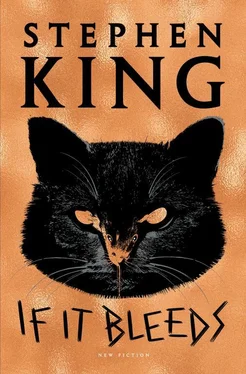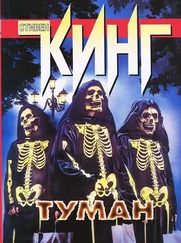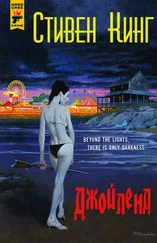Holly comes around the desk, kneels beside him, and puts her arms around him. It’s a clumsy hug with him sitting in the chair, but it does the job. The dam breaks. When he speaks against her cheek, she feels the scratch of his stubble.
“The dog’s dead.”
“What?” She can barely make out what he’s saying through his sobs.
“Lucky. The golden. When whoever stole him didn’t get the ransom, the bastard cut him open and threw him in a ditch. Somebody spotted him—still alive, barely—and took him to the Ebert Animal Hospital in Youngstown. Where he lived for maybe half an hour. Nothing they could do. Not so lucky after all, huh?”
“All right,” Holly says, patting his back. Her own tears are flowing, and there’s snot, too. She can feel it running out of her nose. Oough. “All right, Jerome. It’s okay.”
“It’s not. You know it’s not.” He pulls back and looks at her, cheeks wet and shining, goatee damp. “Cut that nice dog’s belly open, and threw him in the ditch with his intestines hanging out, and you know what happened then?”
Holly knows but shakes her head.
“The bird flew away.” He wipes his sleeve across his eyes. “Now it’s in someone else’s head, it’s better than ever, and on we fucking go.”
4
Just before ten o’clock, Holly gives up the book she’s trying to read and turns on the TV. She takes a look at the talking heads on CNN, but can’t bear their chatter. Hard news is what she wants. She switches to NBC, where a graphic, complete with grim music, reads SPECIAL REPORT: TRAGEDY IN PENNSYLVANIA. Andrea Mitchell is now anchoring in New York. She begins by telling America that the president has tweeted his “thoughts and prayers,” as he does after each of these horror shows: Pulse, Las Vegas, Parkland. This meaningless twaddle is followed by the updated score: thirty-one dead, seventy-three (oh God, so many) wounded, nine in critical condition. If Jerome was right, that means at least three of the criticals have died.
“Two terrorist organizations, Houthi Jihad and the Liberation Tigers of Tamil Eelam, have claimed responsibility for the bombing,” Mitchell says, “but sources in the State Department say neither claim is credible. They are leaning toward the idea that the bombing may have been a lone-wolf attack, similar to that perpetrated by Timothy McVeigh, who set off a huge blast at the Alfred P. Murrah Federal Building in Oklahoma City in 1995. That explosion took a hundred and sixty-eight lives.”
Many of those also children, Holly thinks. Killing children for God, or ideology, or both—no hell could be hot enough for those who’d do such things. She thinks of Jerome’s frosty gray bird.
“The man who delivered the bomb was photographed by a security camera when he buzzed for entry,” Mitchell continues. “We are going to put his picture up for the next thirty seconds. Look closely, and if you recognize him, call the number on your screen. There is a reward of two hundred thousand dollars for his arrest and subsequent conviction.”
The picture comes up. It’s color, and clear as a bell. It’s not perfect because the camera is positioned above the door and the man is looking straight ahead, but it’s pretty good. Holly leans forward, all her formidable job skills—some that were always innate, some honed during her work with Bill Hodges—kicking in. The guy is either Caucasian with a tan (not likely at this time of year but not impossible), a light-skinned Latino, a Middle Easterner, or possibly wearing makeup. Holly opts for Caucasian and makeup. She puts his age as mid-forties. He’s wearing specs with gold frames. His black mustache is small and neatly trimmed. His hair, also black, is short. She can see this because he’s not wearing a cap, which would have obscured more of his face. Bold son of a gun, Holly thinks. He knew there would be cameras, he knew there would be pictures, and he didn’t care.
“Not a son of a gun,” she says, still staring. Recording every feature. Not because this is her case, but because it’s her nature. “He’s a son of a bitch , is what he is.”
Back to Andrea Mitchell. “If you know him, call the number on the screen, and do it right away. Now we’re going to take you to the Macready Middle School and our man on the scene. Chet, are you still there?”
He is, standing in a pool of bright light thrown by the camera. More bright lights are shining on the middle school’s wounded side; each tumbled brick casts its own sharp shadow. Generators are roaring. People in uniform rush here and there, shouting and talking into mikes. Holly sees FBI on some of the jackets, ATF on others. There’s a crew in white Tyvek body suits. Yellow crime scene tape flutters. There is a sense of controlled chaos. At least Holly hopes it’s controlled. Someone must be in charge, maybe in the Winnebago she can see at the far left of the shot.
Lester Holt is presumably at home, watching this in his pj’s and slippers, but Chet Ondowsky is still going. A regular Energizer Bunny is Mr. Ondowsky, and Holly can understand that. This is probably the biggest story he’ll ever cover, he was in on it almost from the start, and he’s chasing it for all he’s worth. He’s still wearing his suit jacket, which was probably okay when he got to the site, but now the temperature has dropped. She can see his breath, and she’s pretty sure he’s shivering.
Someone give him something warmer, for heaven’s sake, Holly thinks. A parka, or even a sweatshirt.
The suit jacket will have to be thrown out. It’s smeared with brick dust and torn in a couple of places, sleeve and pocket. The hand holding the mike is also smeared with brick dust, and something else. Blood? Holly thinks it is. And the streak on his cheek, that’s blood, too.
“Chet?” Andrea Mitchell’s disembodied voice. “Are you there?”
The hand not holding the mike goes to his earpiece, and Holly sees there are Band-Aids on two of the fingers. “Yes, I’m here.” He faces the camera. “This is Chet Ondowsky, reporting from the bombing site at Albert Macready Middle School in Pineborough, Pennsylvania. This ordinarily peaceful school was rocked by an explosion of enormous strength sometime not long after two o’clock this afternoon—”
Andrea Mitchell appears on a split screen. “Chet, we understand from a source at Homeland Security that the explosion happened at two-nineteen P.M. I don’t know how the authorities can pinpoint the time that exactly, but apparently they can.”
“Yes,” Chet says, sounding a little distracted, and Holly thinks how tired he must be. And will he be able to sleep tonight? She guesses not. “Yes, that sounds just about right. As you can see, Andrea, the search for victims is winding down, but the forensic work is just beginning. There will be more personnel on the scene by daybreak, and—”
“Excuse me, Chet, but you took part in the search yourself, is that right?”
“Yes, Andrea, we all pitched in. Townspeople, some of them parents. Also Alison Greer and Tim Witchick from KDKA, Donna Forbes from WPCW, and Bill Larson from—”
“Yes, but I’m hearing you pulled two children from the ruins yourself, Chet.”
He doesn’t bother looking falsely modest and aw-shucks; Holly awards him points for that. He keeps it on a reporting level. “That’s correct, Andrea. I heard one of them moaning and saw the other. A girl and a boy. I know the boy’s name, Norman Fredericks. The girl…” He wets his lips. The mike in his hand trembles, and Holly thinks not just from the cold. “The girl was in bad shape. She was… calling for her mother.”
Andrea Mitchell looks stricken. “Chet, that’s awful.”
It is. Too awful for Holly. She picks up the remote to kill the feed—she has the salient facts, more than she has any use for—and then hesitates. It’s the torn pocket she’s looking at. Maybe torn while Ondowsky was searching for victims, but if he’s Jewish, it might have been done on purpose. It might have been keriah , the rending of garments after a death and the symbolic exposure of a wounded heart. She guesses that is the truth of that torn pocket. It is what she wants to believe.
Читать дальше








